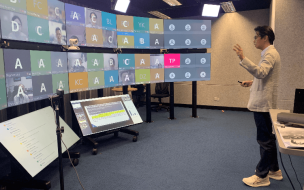Increasingly, MBAs are answering this question in one way—in Asia, specifically Hong Kong.
Long known as the ‘gateway to China’, Hong Kong is justifiably lauded for its strong position between industry and tech centers in China, and the business world of the West.
For many Western businesspeople, Hong Kong is their first stop on the long road to their dream worldwide career.
Take Andrei Ganea, a strategy and innovation manager originally from France. He used an MBA at HKUST Business School in Hong Kong to relocate to Asia, and now works for international organization Schneider Electric.
We caught up with Andrei to find out more about his MBA experience—read his story below.
Why did you decide to do an MBA?
I had a few motivations for getting an MBA.
Firstly, I wanted to change what I was doing. Before my MBA I was a consultant in the telecommunications field, working a lot with international companies, designing technology roadmaps and strategies and optimizing costs and operations.
Part of it was strategy, part was helping with implementation, but after working for 9 years in the field, I wanted to change industry and move to a position where I will have a more direct impact on the business side of the company.
Why did you choose Hong Kong to study?
When I was thinking about the MBA, there were a few options for me: to go to the US, to go to Europe, or to go to Asia.
I wanted to make the most of it, and I didn’t feel that doing an MBA in Europe would do that—I wanted to change my cultural environment and get as far as possible out of my comfort zone.
I thought Asia was more appealing than the US as most of American MBAs are very US focused and, with a majority of American students, lack of diversity compared to European or Asian programs. I therefore only applied to the most interesting and most recognized programs in Asia.
In the end, I chose HKUST because I had the feeling that while it was a highly international program it had real ties with Asia. The people who interviewed me for admission were very realistic about the difficulties a foreigner might face in finding a job in Asia but seemed to also have a real experience in the how to manage a professional transition in the region—I thought that that would be a better choice for me if I want to work in Asia afterwards.
What was the most useful aspect of the course for your career?
Most of the teaching will be lifetime learning that will help me grow my career over the years, but certainly what made the difference for me is the teaching of the more local Asian environment—both essential business knowledge, and networking and how to get a job over here, which is definitely different from other countries.
Being immersed and working with people from a large variety of backgrounds and cultures - we were from more than 20 different countries in my batch - has also been an amazing learning.
How did HKUST help you land your current role?
I started working with Schneider Electric as an intern during my MBA, so actually Schneider found me through HKUST Business School and the alumni and student book! After it was on me to do a good job, network and get a full time position.
How do you think your experience at HKUST made you more appealing to them?
Schneider Electric is a highly international company and Hong Kong is one of their three worldwide hubs, so they’re looking for global multicultural talent.
So, of course, one option would be for them to go and look for people in Europe and the US, but they realized that there is very good-quality teaching in Hong Kong. It makes much more sense for them to recruit people locally as it helps keep contributing to the diversity of the company and to its multicultural aspect.
What’s your long-term career plan?
I’m happy to be working with Schneider Electric as it’s a very international company, empowering its employees and where I am highly interested in my job in the global strategy team.
I will probably use this to move forward to a leadership role at a regional or country level—where? I don’t have specific requirements. I consider myself an international person, and it will definitely depend on the opportunities!
Finally, would you recommend HKUST to other people?
Yes, of course! There were two things about HKUST Business School that I felt were really exciting—the first one is that even though it’s an MBA whose location is Hong Kong, it’s definitely an international MBA. It provides you with world-class teaching quality and with a unique multi-cultural environment.
The cohort had students coming from 22 different countries, so the classes felt very enriching from a personal perspective but also a business perspective, because you get to see how other people work and approach problems.
The school has connections all over the world; we can go on exchange pretty much everywhere, it is connected to multiple international companies—it definitely opens the doors to exciting career perspectives all over the world.
The second one is that at the same time it also has strong ties to Asia, to Hong Kong, and to China, which from my perspective really makes this program unique.
You get to learn about the business specifics of Asian companies and the challenges they face, but also how to be part of the workforce in a part of the world which is challenging in different ways to both Europe and the US and requires a different approach.
It is in my opinion the best program for somebody who wants to gain a global perspective on the world and to understand Asia, which actually given its economic weight and importance should be a must for whoever wants to develop an international career.
It is, of course, also the best place for landing a job in Hong Kong, China, or Asia more globally post-MBA.
Student Reviews
HKUST Business School









